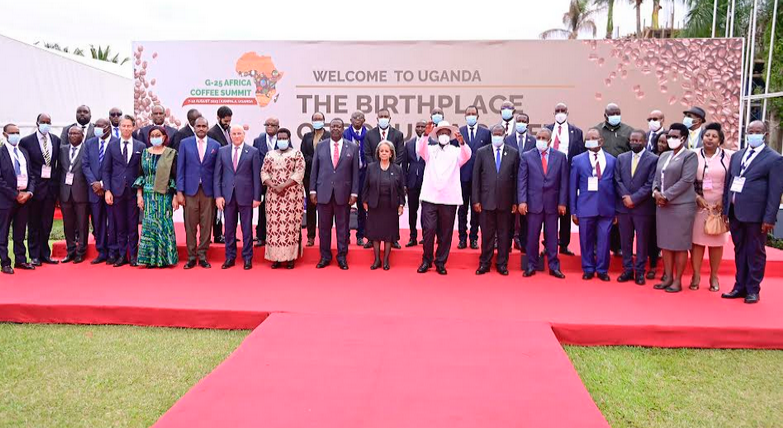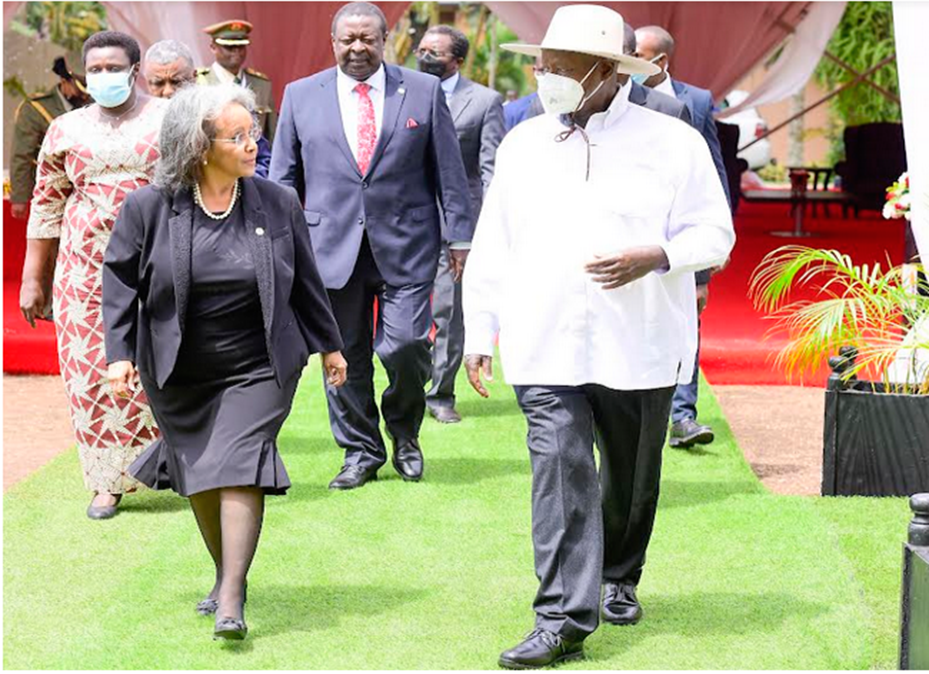President Museveni challenges African leaders on value addition

President Museveni has challenged African leaders to add value to raw materials to increase jobs and wealth creation during the opening of the G25 Africa coffee summit held at Speke resort Munyonyo running under the theme “Transforming the African Coffee Sector through Value Addition.”

President Museveni (Centre) with other African leaders and representatives posing for the photo after the summit.
During the opening of the G25 Africa Coffee Summit, held at Speke Resort Munyonyo with the theme “Transforming the African Coffee Sector through Value Addition,” yesterday, August 8, 2023, President Museveni challenged African leaders to add value to raw materials to increase job and wealth creation.
Museveni reiterated his call to add value to Ugandan and African Coffee at large. He says that if such a step is taken, the producers of the prestigious agricultural commodity will be able to get a fair share of the global market.
“In the last 60 years, I have been involved in the struggle against this modern slavery for Africa the curse of producing raw materials for cleverer people in the world to add value to those raw materials and get much more value from them. A kg of bean coffee of good quality may go for US$2.5 per kg. The same quantity of coffee roasted, ground, and packaged may go for US$40. This is where there is a massive haemorrhage of money from the global South to the global North. It is not only the loss of money per kg. It is also the loss of jobs. If you take the whole spectrum of raw materials from agriculture, minerals, forest products, etc., the loss to Africa is massive,” President Museveni said.
He says many jobs are lost as African countries continue to export unprocessed goods at a low cost which benefits countries where these products are exported.
Museveni noted that the said business model is a typical global parasitic system where European countries take from Africans and later sell their products at a higher cost.
He is concerned that Africa only gets $2.4 billion out of the global $460 billion value of coffee.
“We also need to sensitise our partners in the countries that have been buying our raw materials at semi-slave prices, that their economics is defective,” Museveni said.
“What will the USA, Europe or Asia lose if Africa sells added-value coffee to them instead of the raw-material form and earn more money?” he asked.
Museveni made the remarks at the opening of the G25 Africa coffee summit, where African leaders have converged to discuss value addition to African coffee.
He urged fellow leaders to make sure that coffee is consumed both as a beverage and a stimulus product.
Museveni explained that Uganda has managed to build an Independent and self-sustaining (with both vertical and horizontal integration) economy with registered success in some sectors such as dairy, fisheries, textiles, sugar, and leather, among others. However, in many sectors, including that of coffee, the country is still losing a lot of money and jobs on account of exporting unprocessed raw materials abroad.
“The biggest opposition to our plan of building an integrated national economy has been, mainly, internal, from some elements of the political and bureaucratic classes who perform the role of the comprador bourgeoisie, agents of foreign interests, as Mao Tse Tung talked about in China. Unlike the national bourgeoisie, who build our economy, the comprador bourgeoisie (raw-materials exporters, importers of foreign products that can be made here, commission agents) bleed our economy.”
“The national bourgeoisie (manufacturers, hotel owners, tourism operators, professional service providers such as doctors who treat people here instead of patients going out for treatment, internal distributors of our products such as food) builds our economy,” he stressed.
The President of the Federal Democratic Republic of Ethiopia, H.E. Sahle-Work Zewde, expressed optimism that the summit will provide an opportunity to keep and accelerate the momentum of the coffee sector in Africa.

President Museveni and The President of the Federal Democratic Republicof Ethiopia, Her Excellency, Sahle-Work Zewde arriving at the summit yesterday.
“I’m here because we also believe in collective action for us to occupy our rightful place in the global market,” H.E. Zewde said.
She, however, expressed concern that, despite being one of the most traded commodities globally and consumed by people from all corners of the world, coffee didn’t receive the proper attention it deserved compared to even some less traded commodities.
The President attributed the setback to the weak bargaining power of the producers and the lack of strong organizations committed to working on their behalf and for their benefit.
“Filling this gap should be the aim and priority of the Inter-African Coffee Organization. I believe this second G-25 Africa Coffee Summit will encourage such a mandate. The food farmers sweat to produce the best quality coffee for the international market, but it’s the traders who decide the international coffee price in the absence of the producers or their rightful representation. The very producers are price takers and remain at the receiving end throughout the market chain. We all must work to end this market unfairness together,” H.E. Zewde stated.
The Vice President of Tanzania, Dr. Philip Isdor Mpango, said nearly half of Africa’s countries grow coffee, and for some countries, such as Tanzania, it constitutes a major source of foreign exchange and a vital contributor to their GDP.
“Given this importance, it’s timely that we have the G-25 Africa Coffee Summit, and I want to underscore that we should use this platform to unanimously push for a declaration of coffee as a strategic commodity in harmony with the AU Agenda 2063; promote value addition; agree on how to expand the original coffee trade; and discuss remedial measures to underline risks to this important cash crop,” he said.
At the same event, the African coffee-producing countries signed the Kampala Declaration. The Minister of Agriculture, Animal Industry, and Fisheries, Hon. Frank Tumwebaze, signed on behalf of Uganda, whereas other coffee-producing countries were represented by Dr. Girma Amente, the Chairman of the Inter-Africa Coffee Organization, and the Minister of Agriculture of Ethiopia.







